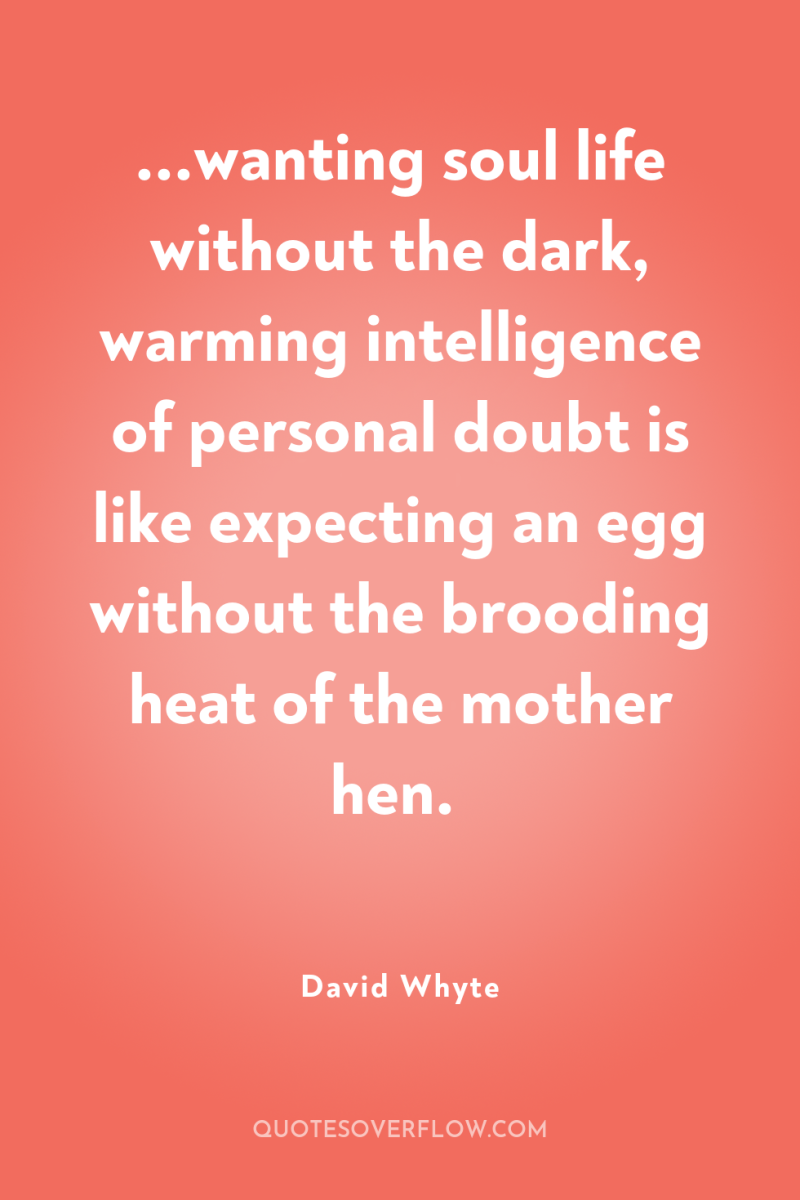
1
...wanting soul life without the dark, warming intelligence of personal doubt is like expecting an egg without the brooding heat of the mother hen.David Whyte
2
Solace is what we must look for when the mind cannot bear the pain, the loss or the suffering that eventually touches every life and every endeavour; when longing does not come to fruition in a form we can recognize, when people we know and love disappear, when hope must take a different form than the one we have shaped for it.David Whyte
3
Stop trying to change reality by eliminating complexity.David Whyte
4
Forgiveness is a heartache and difficult to achieve because strangely, it not only refuses to eliminate the original wound, but actually draws us closer to its source. To approach forgiveness is to close in on the nature of the hurt itself, the only remedy being, as we approach its raw centre, to reimagine our relation to it.David Whyte
5
One of the most beautifully disturbing questions we can ask, is whether a given story we tell about our lives is actually true, and whether the opinions we go over every day have any foundation or are things we repeat to ourselves simply so that we will continue to play the game. It can be quite disorienting to find that a story we have relied on is not only not true - it actually never was true. Not now not ever. There is another form of obsolescence that can fray at the cocoon we have spun about ourselves, that is, the story was true at one time, and for an extended period; the story was even true and good to us, but now it is no longer true and no longer of any benefit, in fact our continued retelling of it simply imprisons us. We are used to the prison however, we have indeed fitted cushions and armchairs and made it comfortable and we have locked the door from the inside. The imprisoning story I identified by the time the entree was served was one I had told myself for a long time. “In order to write I need peace and quiet and an undisturbed place far from others or the possibility of being disturbed. I knew however, that if I wanted to enter the next creative stage, something had to change; I simply did not have enough free space between traveling, speaking and being a good father and husband to write what I wanted to write. The key in the lock turned surprisingly easy, I simply said to myself, “What if I acted as if it wasn’t true any more, what if it had been true at one time, but now at this stage in the apprenticeship I didn’t need that kind of insulation anymore, what if I could write anywhere and at any time?” One of the interesting mercies of this kind of questioning is that it is hard to lose by asking: if the story is still true, we will soon find out and can go back to telling it. If it is not we have turned the key, worked the hinges and walked out into the clear air again with a simple swing of the door. .David Whyte
6
The lost sense that we play out our lives as part of a greater storyDavid Whyte
7
In Germany, they have great difficulty with anything that smacks of cultism or messianic leadership. You can't talk about leadership in its charismatic forms.David Whyte
8
Poetry gives us courage and sets us straight with the world. Poems are great companions and friends.David Whyte
9
A good poem brims with reflected beauty and even a bracing, beautiful ugliness. At the center of our lives, in the midst of the busyness and the forgetting, is a story that makes sense when everything extraneous has been taken away.David Whyte
10
All of our great traditions, religious, contemplative and artistic, say that you must a learn how to be alone - and have a relationship with silence. It is difficult, but it can start with just the tiniest quiet moment.David Whyte
11
Honesty lies in understanding our close and necessary relationship with not wanting to hear the truth.David Whyte
12
The thing about great poetry is we have no defenses against it.David Whyte
13
Poetry is often the art of overhearing yourself say things you didn't know you knew. It is a learned skill to force yourself to articulate your life, your present world or your possibilities for the future.David Whyte
14
There's a fierce practicality and empiricism which the whole imaginative, lyrical aspect of poetry comes from.David Whyte
15
Poetry is a street fighter. It has sharp elbows. It can look after itself. Poetry can't be used for manipulation it's why you never see good poetry in advertising.David Whyte
16
By definition, poetry works with qualities and dynamics that mainstream society is reluctant to face head-on. It's an interesting phenomenon that by necessity, poetry is just below the radar.David Whyte
17
It is the province of poetry to be more realistic and present than the artificial narratives of an outer discourse, and not afraid of the truthful difficulty of the average human life.David Whyte
18
Poetry carries the imagery which is large enough for the kind of life we want for ourselves.David Whyte